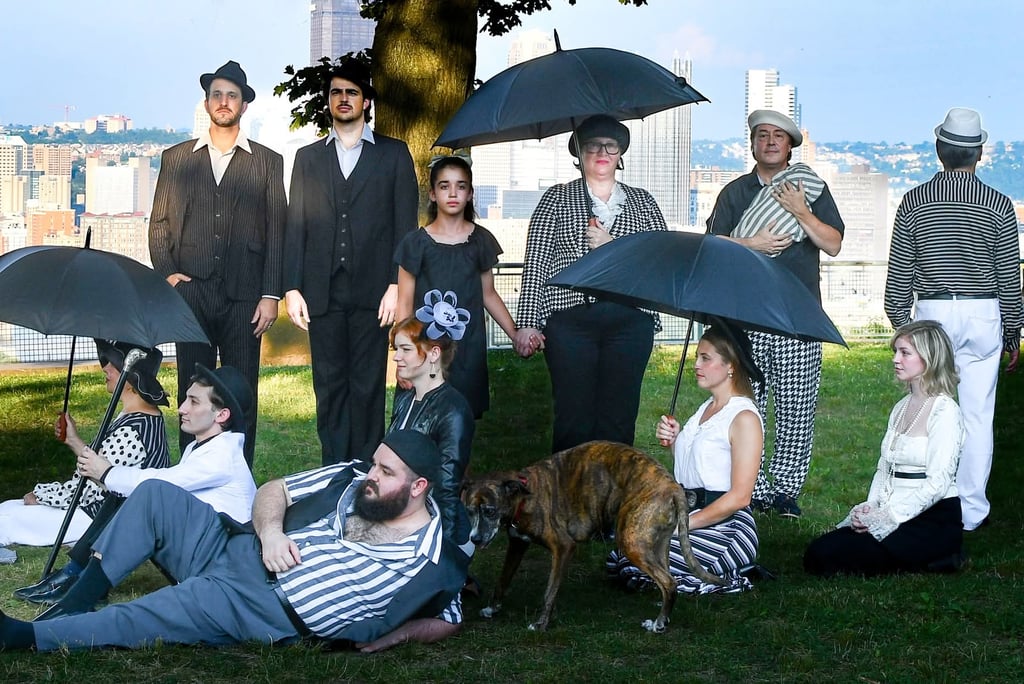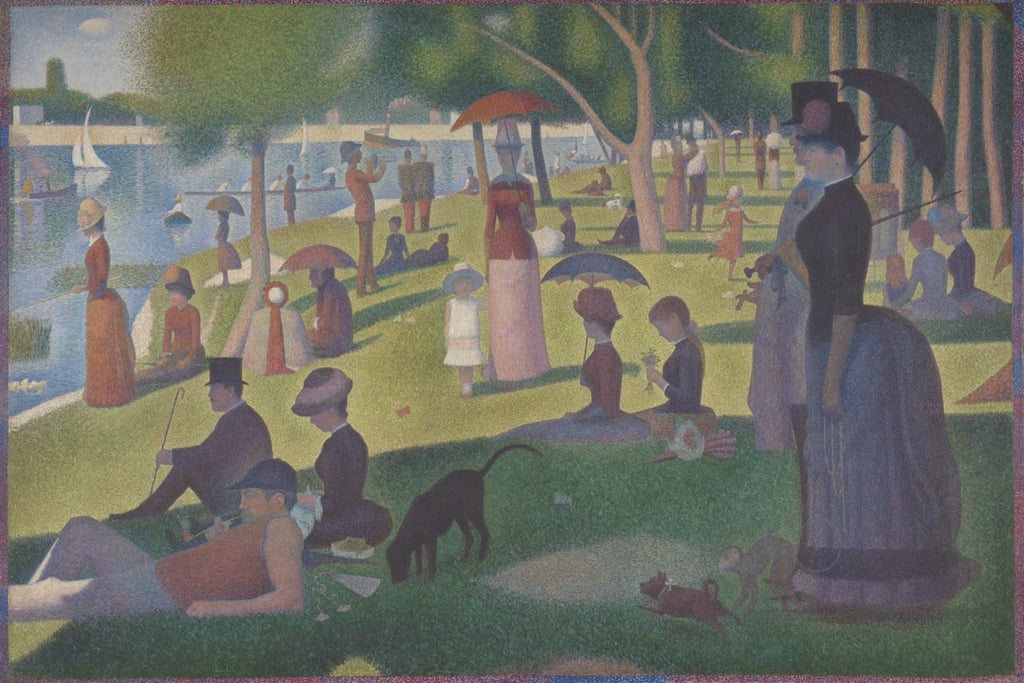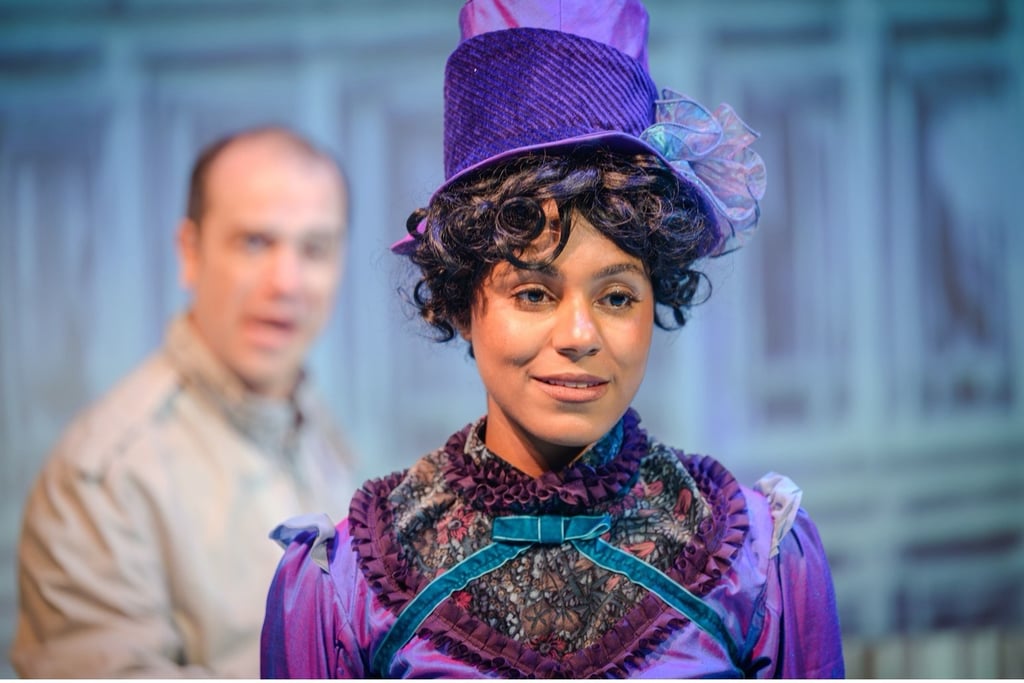Art, Legacy, and the Limits of Representation in Sunday in the Park with George
I have some mixed feelings toward Sunday in the Park with George in 2025 after watching Front Porch Theatricals’ production: even after I left the New Hazlett Theater, I keep wondering if this play will pass the Bechdel test.
Mingsi Ma
8/22/20253 min read


Front Porch Theatricals’ Sunday in the Park with George. Photo credit: Deana Muro
By Mingsi Ma
Front Porch Theatricals’ Sunday in the Park with George indulges us in the fantasy created by the late American musical theater titan Stephen Sondheim, surrounding French painter George Seurat and his fictional great-grandson. The story brims with fascinating imagination and “what-ifs,” as the figures in George Seurat’s A Sunday on La Grande Jatte come to life and interact with one another, and later George’s fictional great-grandson, also named George, traces his footsteps as a painter. It reminds me a lot of the moving portraits in Hogwarts’ hallways in Harry Potter and canvases coming to life after dark in Night at the Museum.


A Sunday on La Grande Jatte by George Seurat, housed in The Art Institute of Chicago.
Directed by Rob James, Front Porch Theatricals features Aaron Galligan-Stierle as George, with Saige Smith starring George’s lover Dot in the first act and George’s daughter Marie in the second. Saige Smith’s voice is bright and silky, like chocolate on the tongue. In the opening song, “Sunday in the Park with George,” Smith aces multiple rapid, breathless, and tricky musical passages that demand tonal precision in the shifting melody. Her interpretation of Dot is lively, spirited, and affectionate, with similar qualities to Eliza Doolittle in My Fair Lady. Smith’s Dot loves and hates with passion, and the occasional soft spots in her performance add even more humanity to the character.
Many supporting characters also shine on stage. Robert Frankenberry’s Louis offers a warm contrast to George’s aloofness, strolling around with cupcakes in hand and winning everyone’s affection. Striding with his head held high and making his entrance by tapping a cane on the floor, Brad Smoak convincingly portrays George’s rival, Jules. You know he succeeds when the character feels obnoxious and annoying.
I also love Ben Nadler’s performance as Franz and Dennis in two different acts: one as a servant, the other as the artist’s assistant. As Franz, he leans into the humor, exaggerating his facial expressions so that even those seated in the last rows can enjoy them. What amazes me is how seamlessly and convincingly he shifts into an entirely different character, from a disgruntled, snobbish servant to a gentle, agreeable assistant when the story turns to its modern lens.


Saige Smith stars as George’s lover Dot in the first act and George’s daughter Marie in the second.
Still, for all the strengths of Front Porch Theatricals’ production, it is Dot’s struggle in Act 1 that lingers most in my thoughts, staying with me long after I leave the theater. While Dot loves the George with sparks in his eyes, she keeps hoping he will be there for her and will lift his head to look at her when painting. As Dot sings and pleads with George, the singing line is lost in her lark-like voice repeating his name.
In the producer Nancy Zionts’ opening speech, she uses the word “legacy” to describe what Sunday in the Park with George is about. She’s not wrong. In Act 1, George’s dedication to the arts is admirable. His story inspires his artist great-grandson to change his attitude from shaking hands, sipping cocktails with wealthy patrons, and securing new gallery deals to clearing his mind and finding a calling in art. It is brilliant that director Rob James and scenic designer Johnmichael Bohach chose to use life-size cardboard cutouts of the artist’s great-grandson for actor Aaron Galligan-Stierle to perform with, as a satire on the great-grandson being a social butterfly lacking genuineness before his shift in perspective.
However, interpreting this play only through the lens of the younger generation looking up to a great master and a family story for guidance in pursuing true art feels somewhat limited in our time. The Bechdel question is not a critique of this particular staging by Front Porch Theatricals so much as a reminder of the play’s 1984 origins and how our conversations about gender representation have drastically shifted since then.
When Dot turns her back and embraces Louis, she gives up her relationship with George to find someone she thinks she needs. But why? Why does her life have to be all about some men? Besides the fact that I can barely recall any meaningful conversations between two women on stage that are not about George, watching in 2025, it is hard to ignore the gap between Dot’s vivid presence and the limited ways her story is allowed to unfold beyond her romantic struggles with men.
Catch Front Porch Theatricals’ Sunday in the Park with George before it closes on Sunday, August 24, 2025, at the New Hazlett Theater.